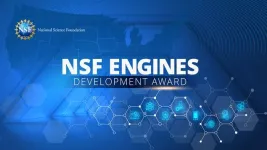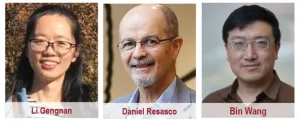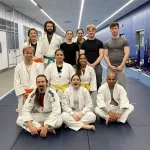(Press-News.org) Glasgow, UK: Xeroderma pigmentosum (XP) is a rare and devastating genetic disorder characterised by an inability to repair skin damage caused by ultraviolet (UV) light. As a result, patients with XP develop skin cancers, usually in childhood. Once diagnosed, they can be protected by avoiding sunlight (hence sometimes being called ‘children of the night’), wearing special clothing and sunglasses, and using sunscreen. But some will also develop neurodegenerative conditions such as hearing loss, loss of intellectual function, poor co-ordination and seizures. Finding out why this is, and which patients are likely to develop such conditions, is a priority for XP researchers.
Dr Sophie Momen, a consultant dermatologist at Guy’s and St Thomas’ NHS Foundation Trust, London, UK and a researcher in Professor Serena Nik-Zainal’s lab at the University of Cambridge, will tell the annual conference of the European Society of Human Genetics today (Monday) of her team’s work in the development of an early detection algorithm to predict which patients may develop such neurodegeneration. Until now there has been little research in this area, partly because XP is a rare condition, affecting one person in a million, and because the brain, being an inaccessible organ in live patients, is very difficult to perform research on.
The researchers took blood samples from patients with XP with and without neurodegeneration, and from family members without XP, and turned these samples into pluripotent stem cells (cells that can be groomed into different cell types). The researchers were then able to identify the stem cells that would become brain cells (neurons). “We carried out various experiments on these neurons using multi-omic1 technologies to try to understand why some XP patients developed neurodegeneration and some did not. From this we were able to develop our algorithm. This will be useful if we can offer something to patients to try to slow down or halt the onset of neurodegeneration. Our research has revealed possible drug targets, which may do just that in the future,” says Dr Momen.
The researchers were fortunate, they say, in having access to a large group of patients from the national XP clinic at Guy’s and St Thomas’, where all British-resident patients with the condition are cared for by the same clinical team. “Having such a clinic means that patients with rare diseases can be followed up long-term in one place, and this facilitates investigations such as ours,” Dr Momen says. “This is the first time that so many patients with XP have been studied and their neurons have been characterised in such depth.”
Since the clinic came into being in 2010 , patients in the UK have been well-informed about photoprotection and about early detection of skin cancers, and as a result they are living long lives. “None of our patients has died from skin cancer,” says Dr Momen. “It is often said that patients with XP die in their 20s and 30s, either due to skin cancers or neurodegeneration, but this is not always the case. It is important to recognise that there are some patients with XP who do not develop neurodegeneration and mainly develop skin cancers, against which they can take protective measures at an early stage.”
The results may also be useful in understanding why otherwise healthy people develop neurodegeneration as they age. Over the past few years, the study of patients with XP has helped scientists to understand why some otherwise healthy people develop skin cancers after exposure to UV light. “We can now extrapolate the findings in our study to the understanding of why the faulty DNA repair pathway involved in XP is involved in brain health and this may, in turn, help us understand why some people develop neurodegeneration as they age.”
.
Further validation studies of the early detection algorithm will be necessary before it can be used as a predictive tool in clinical practice. Clinical trials will also be needed to see which, if any, medications may be useful in halting or delaying neurodegeneration in patients identified as being at risk.
“ I did not expect that we would be able to characterise the neurons derived from those patients with and without neurodegeneration so clearly. When we used proteomics, the results allowed us to see clearly whether patients had neurodegeneration or not,” says Dr Momen. “This is very encouraging and, we hope, a further step along the road to effective treatment of this distressing condition.”
Professor Alexandre Reymond, chair of the conference, said: “Our ability to personalise treatments will translate into a more effective health system. To reach this goal, we need new approaches to recognise those in the population who are more at risk.”
(ends)
1.Multiomics is an approach to biological analysis that combines various ‘ome’ datasets, for example genome, proteome, transcriptome, epigenome, metabolome, and micobiome.
Abstract no. 3869 Functional multi-omic studies unveil ER stress and proteasomal dysfunction in early-onset neurodegeneration in XP
END
Research brings hope for early treatment of brain degeneration in ‘children of the night’
2023-06-12
ELSE PRESS RELEASES FROM THIS DATE:
Polygenic risk scores could improve colorectal cancer screening
2023-06-12
Glasgow, UK: Rates of colorectal cancer are high despite widespread adoption of screening programmes in many high-income European countries. Such programmes tend to use a one-size-fits-all approach where most people are screened starting from the same age, and no individual factors are considered in organised population screening. Now, based on one of the largest genomics studies on the topic to date, researchers from Finland have outlined how common genetic factors could be used to identify individuals at high risk of developing the disease and hence improve current colorectal screening strategies.
Max Tamlander, MD at the Institute ...
Results from first randomised controlled trial of genetic counselling for familial and inherited colorectal cancer show significant improvements in patient empowerment
2023-06-11
Glasgow, UK: Genetic counselling is essential when dealing with individuals who are affected by, or at risk of, inherited disease. Although it is known to be useful in helping patients cope with test results and deal with uncertainty, there have been very few randomised controlled trials (RCTs) of its effectiveness. Dr Andrada Ciuca, a post-doctoral researcher at Babes-Bolyai University, Cluj-Napoca, Romania, will tell the annual conference today (Sunday 11 June) that the results of the first RCT of genetic counselling in familial colorectal cancer (fCRC) show that it provided significant ...
Blood biomarkers plus genomics predict common disease risk more accurately than genomic information alone
2023-06-10
Glasgow, UK: Being to identify people at high risk of chronic disease means that they can be targeted with prevention measures before they become sick. Polygenic risk scores, where genomic information alone is used to assess the risk of developing diseases, have been receiving a lot of attention recently, but research to be presented at the annual conference of the European Society of Human Genetics today (Saturday 10 June) suggests that combining blood biomarkers with genomic information gives more accurate, cost-effective results.
Dr Jeffrey Barrett, Chief Scientific Officer, Nightingale Health, Helsinki, ...
The use of AI in eye scans helps improve diagnosis of inherited disease of the retina
2023-06-10
Glasgow, UK: Inherited retinal diseases (IRDs), single-gene disorders affecting the retina, are very difficult to diagnose since they are uncommon and involve changes in one of many candidate genes. Outside specialist centres, there are few experts who have adequate knowledge of these diseases, and this makes it difficult for patients to access proper testing and diagnosis. But now, researchers from the UK and Germany have used artificial intelligence (AI) to develop a system that they believe will enable more widespread provision of testing, together with improved efficiency.
Dr ...
University of Tennessee, Knoxville, partners on multi-university NSF Engines Development Award
2023-06-09
The University of Tennessee, Knoxville, is partnering with other Southeastern universities in a coalition exploring methods for driving U.S. economic competitiveness. The initiative is supported by a two-year, Type 1 Development Award worth $1 million, funded by the National Science Foundation’s (NSF) Regional Innovation Engines. The team was one of only 44 out of 497 Type-1 applications the NSF funded, marking the first time the NSF has distributed Regional Innovation Engines grants.
Thomas Goldsby, Dee and Jimmy Haslam Chair in Logistics at UT’s Haslam College of Business Department of Supply Chain Management, ...
The future of industrial chemicals: OU engineers seek more efficient processes
2023-06-09
A study by a team of University of Oklahoma researchers has been featured in Cell Reports Physical Science, an open-access journal highlighting cutting-edge research in the physical sciences.
The study, “Cooperative roles of water and metal-support interfaces in the selective hydrogenation of cinnamaldehyde over cobalt boride catalysts,” explores the role of water in the selective hydrogenation of carbonyl over alkene bonds. Utilizing cobalt and cobalt boride catalysts, OU researchers analyzed the hydrogenation ...
Jiu Jitsu club stage physical assaults to help advance forensic research
2023-06-09
Researchers from Northumbria University and King’s College London have published findings outlining the extent that textile fibres transfer during controlled assault scenarios.
Their work, recently published in the academic journal Science & Justice, is the first time the number of fibres transferred between garments during physical assaults has been assessed by simulating the act with real people through Northumbria University’s Jiu Jitsu club.
Dr Kelly Sheridan, Assistant Professor of Forensic Science in Northumbria’s Department of Applied Sciences, believes the findings will ...
University of Chicago mathematician Vladimir Drinfeld wins prestigious Shaw Prize
2023-06-09
Vladimir Drinfeld, the Harry Pratt Judson Distinguished Service Professor of Mathematics at the University of Chicago, is one of two recipients of the prestigious Shaw Prize in Mathematical Sciences for 2023.
He shares this year’s honor jointly with Shing-Tung Yau of Tsinghua University for their “contributions related to mathematical physics, to arithmetic geometry, to differential geometry and to Kähler geometry.”
The Shaw Prize honors individuals who have recently achieved distinguished and significant advances in the fields of astronomy, life science and medicine, and mathematical sciences. Each category carries a monetary award of ...
Similar symptoms, biological abnormalities underlie long COVID and chronic fatigue syndrome
2023-06-09
Long COVID and myalgic encephalomyelitis/chronic fatigue syndrome are debilitating conditions with similar symptoms. Neither condition has diagnostic tests or treatments approved by the Food and Drug Administration (FDA) and each cost the United States billions of dollars each year in direct medical expenses and lost productivity. Doctors and researchers have wondered what are the underlying biological abnormalities that may cause symptoms, and whether these abnormalities are similar in the two illnesses.
A review article authored by senior investigators at Brigham and Women’s Hospital and Harvard Medical School, and the Mailman School of Public Health and Vagelos ...
Interdisciplinary team receives continued support to visualize the past
2023-06-09
The National Endowment for the Humanities awarded a $98,500 grant to an interdisciplinary team led by Virginia Tech to create an augmented reality program prototype that brings Civil War history to park visitors’ fingertips. Experts from Virginia Tech, Virginia Commonwealth University, Pamplin Historical Park, and its National Museum of the Civil War Soldier in Petersburg, Virginia, are involved in the project.
From multimedia-guided interpretations of documents to videos of historians sharing ...




